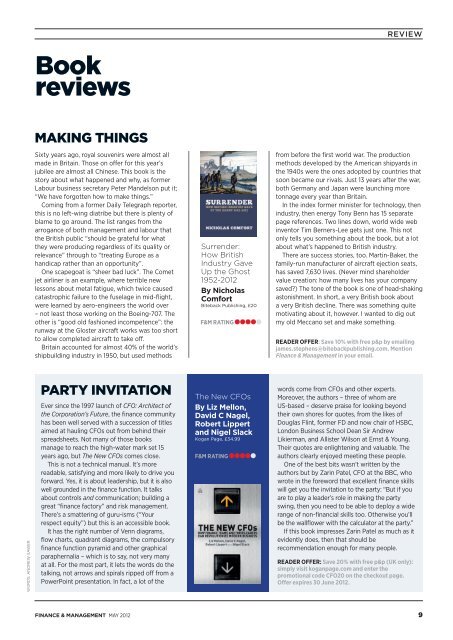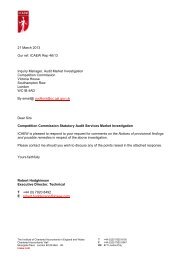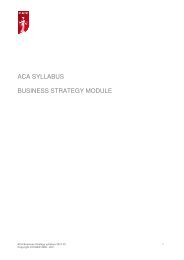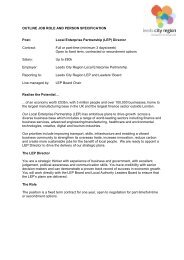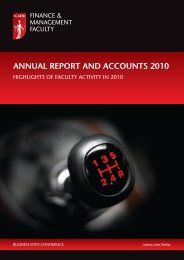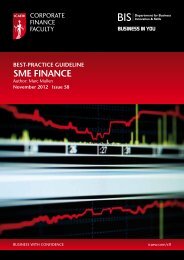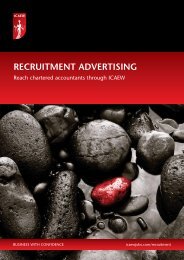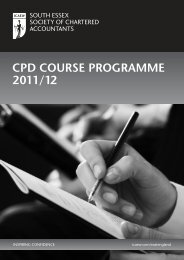Hit the road Positive leadership for troubled times - ICAEW
Hit the road Positive leadership for troubled times - ICAEW
Hit the road Positive leadership for troubled times - ICAEW
Create successful ePaper yourself
Turn your PDF publications into a flip-book with our unique Google optimized e-Paper software.
REVIEW<br />
Book<br />
reviews<br />
MAKING THINGS<br />
Sixty years ago, royal souvenirs were almost all<br />
made in Britain. Those on offer <strong>for</strong> this year’s<br />
jubilee are almost all Chinese. This book is <strong>the</strong><br />
story about what happened and why, as <strong>for</strong>mer<br />
Labour business secretary Peter Mandelson put it;<br />
“We have <strong>for</strong>gotten how to make things.”<br />
Coming from a <strong>for</strong>mer Daily Telegraph reporter,<br />
this is no left-wing diatribe but <strong>the</strong>re is plenty of<br />
blame to go around. The list ranges from <strong>the</strong><br />
arrogance of both management and labour that<br />
<strong>the</strong> British public “should be grateful <strong>for</strong> what<br />
<strong>the</strong>y were producing regardless of its quality or<br />
relevance” through to “treating Europe as a<br />
handicap ra<strong>the</strong>r than an opportunity”.<br />
One scapegoat is “sheer bad luck”. The Comet<br />
jet airliner is an example, where terrible new<br />
lessons about metal fatigue, which twice caused<br />
catastrophic failure to <strong>the</strong> fuselage in mid-flight,<br />
were learned by aero-engineers <strong>the</strong> world over<br />
– not least those working on <strong>the</strong> Boeing-707. The<br />
o<strong>the</strong>r is “good old fashioned incompetence”: <strong>the</strong><br />
runway at <strong>the</strong> Gloster aircraft works was too short<br />
to allow completed aircraft to take off.<br />
Britain accounted <strong>for</strong> almost 40% of <strong>the</strong> world’s<br />
shipbuilding industry in 1950, but used methods<br />
Surrender:<br />
How British<br />
Industry Gave<br />
Up <strong>the</strong> Ghost<br />
1952-2012<br />
By Nicholas<br />
Com<strong>for</strong>t<br />
Biteback Publishing, £20<br />
F&M RATING<br />
from be<strong>for</strong>e <strong>the</strong> first world war. The production<br />
methods developed by <strong>the</strong> American shipyards in<br />
<strong>the</strong> 1940s were <strong>the</strong> ones adopted by countries that<br />
soon became our rivals. Just 13 years after <strong>the</strong> war,<br />
both Germany and Japan were launching more<br />
tonnage every year than Britain.<br />
In <strong>the</strong> index <strong>for</strong>mer minister <strong>for</strong> technology, <strong>the</strong>n<br />
industry, <strong>the</strong>n energy Tony Benn has 15 separate<br />
page references. Two lines down, world wide web<br />
inventor Tim Berners-Lee gets just one. This not<br />
only tells you something about <strong>the</strong> book, but a lot<br />
about what’s happened to British industry.<br />
There are success stories, too. Martin-Baker, <strong>the</strong><br />
family-run manufacturer of aircraft ejection seats,<br />
has saved 7,630 lives. (Never mind shareholder<br />
value creation: how many lives has your company<br />
saved?) The tone of <strong>the</strong> book is one of head-shaking<br />
astonishment. In short, a very British book about<br />
a very British decline. There was something quite<br />
motivating about it, however. I wanted to dig out<br />
my old Meccano set and make something.<br />
READER OFFER: Save 10% with free p&p by emailing<br />
james.stephens@bitebackpublishing.com. Mention<br />
Finance & Management in your email.<br />
WORDS: ANDREW SAWER<br />
PARTY INVITATION<br />
Ever since <strong>the</strong> 1997 launch of CFO: Architect of<br />
<strong>the</strong> Corporation’s Future, <strong>the</strong> finance community<br />
has been well served with a succession of titles<br />
aimed at hauling CFOs out from behind <strong>the</strong>ir<br />
spreadsheets. Not many of those books<br />
manage to reach <strong>the</strong> high-water mark set 15<br />
years ago, but The New CFOs comes close.<br />
This is not a technical manual. It’s more<br />
readable, satisfying and more likely to drive you<br />
<strong>for</strong>ward. Yes, it is about <strong>leadership</strong>, but it is also<br />
well grounded in <strong>the</strong> finance function. It talks<br />
about controls and communication; building a<br />
great “finance factory” and risk management.<br />
There’s a smattering of guru-isms (“Your<br />
respect equity”) but this is an accessible book.<br />
It has <strong>the</strong> right number of Venn diagrams,<br />
flow charts, quadrant diagrams, <strong>the</strong> compulsory<br />
finance function pyramid and o<strong>the</strong>r graphical<br />
paraphernalia – which is to say, not very many<br />
at all. For <strong>the</strong> most part, it lets <strong>the</strong> words do <strong>the</strong><br />
talking, not arrows and spirals ripped off from a<br />
PowerPoint presentation. In fact, a lot of <strong>the</strong><br />
The New CFOs<br />
By Liz Mellon,<br />
David C Nagel,<br />
Robert Lippert<br />
and Nigel Slack<br />
Kogan Page, £34.99<br />
F&M RATING<br />
words come from CFOs and o<strong>the</strong>r experts.<br />
Moreover, <strong>the</strong> authors – three of whom are<br />
US-based – deserve praise <strong>for</strong> looking beyond<br />
<strong>the</strong>ir own shores <strong>for</strong> quotes, from <strong>the</strong> likes of<br />
Douglas Flint, <strong>for</strong>mer FD and now chair of HSBC,<br />
London Business School Dean Sir Andrew<br />
Likierman, and Allister Wilson at Ernst & Young.<br />
Their quotes are enlightening and valuable. The<br />
authors clearly enjoyed meeting <strong>the</strong>se people.<br />
One of <strong>the</strong> best bits wasn’t written by <strong>the</strong><br />
authors but by Zarin Patel, CFO at <strong>the</strong> BBC, who<br />
wrote in <strong>the</strong> <strong>for</strong>eword that excellent finance skills<br />
will get you <strong>the</strong> invitation to <strong>the</strong> party: “But if you<br />
are to play a leader’s role in making <strong>the</strong> party<br />
swing, <strong>the</strong>n you need to be able to deploy a wide<br />
range of non-financial skills too. O<strong>the</strong>rwise you’ll<br />
be <strong>the</strong> wallflower with <strong>the</strong> calculator at <strong>the</strong> party.”<br />
If this book impresses Zarin Patel as much as it<br />
evidently does, <strong>the</strong>n that should be<br />
recommendation enough <strong>for</strong> many people.<br />
READER OFFER: Save 20% with free p&p (UK only):<br />
simply visit koganpage.com and enter <strong>the</strong><br />
promotional code CFO20 on <strong>the</strong> checkout page.<br />
Offer expires 30 June 2012.<br />
FINANCE & MANAGEMENT MAY 2012 9


